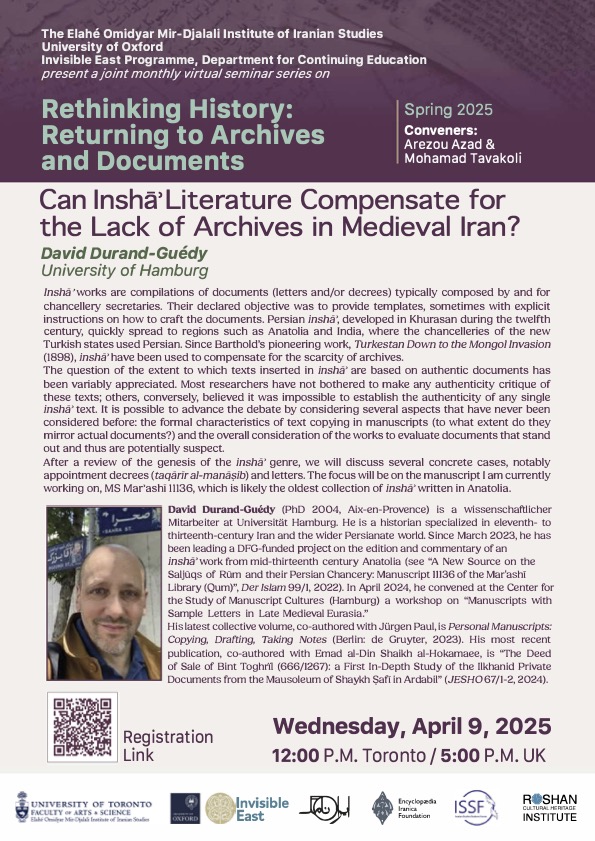

The Elahé Omidyar Mir-Djalali Institute of Iranian Studies, University of Toronto, and the Invisible East Programme, Department for Continuing Education, University of Oxford jointly present
“Can Inshāʾ Literature Compensate for the Lack of Archives in Medieval Iran?”
Dr. David Durand-Guédy, Universität Hamburg
Wednesday, 9 April 2025, 12:00 p.m. Toronto/5:00 p.m. UK
Zoom Meeting Registration:
https://utoronto.zoom.us/meeting/register/WIQppj7tRMGqiqueSdLg0A
After registering, you will receive a confirmation email containing information about joining the meeting.
Abstract:
Inshāʾ works are compilations of documents (letters and/or decrees) typically composed by and for chancellery secretaries. Their declared objective was to provide templates, sometimes with explicit instructions on how to craft the documents. Persian inshāʾ, developed in Khurasan during the twelfth century, quickly spread to regions such as Anatolia and India, where the chancelleries of the new Turkish states used Persian. Since Barthold’s pioneering work, Turkestan Down to the Mongol Invasion (1898), inshāʾ have been used to compensate for the scarcity of archives.
The question of the extent to which texts inserted in inshāʾ are based on authentic documents has been variably appreciated. Most researchers have not bothered to make any authenticity critique of these texts; others, conversely, believed it was impossible to establish the authenticity of any single inshāʾ text. It is possible to advance the debate by considering several aspects that have never been considered before: the formal characteristics of text copying in manuscripts (to what extent do they mirror actual documents?) and the overall consideration of the works to evaluate documents that stand out and thus are potentially suspect.
After a review of the genesis of the inshāʾ genre, we will discuss several concrete cases, notably appointment decrees (taqārīr al-manāṣib) and letters. The focus will be on the manuscript I am currently working on, MS Marʿashī 11136, which is likely the oldest collection of inshāʾ written in Anatolia.
Bio:
David Durand-Guédy (PhD 2004, Aix-en-Provence) is a wissenschaftlicher Mitarbeiter at Universität Hamburg. He is a historian specialized in eleventh- to thirteenth-century Iran and the wider Persianate world. Since March 2023, he has been leading a DFG-funded project on the edition and commentary of an inshāʾ work from mid-thirteenth century Anatolia (see “A New Source on the Saljūqs of Rūm and their Persian Chancery: Manuscript 11136 of the Marʿashī Library (Qum)”, Der Islam 99/1, 2022). In April 2024, he convened at the Center for the Study of Manuscript Cultures (Hamburg) a workshop on “Manuscripts with Sample Letters in Late Medieval Eurasia”.
His latest collective volume, co-authored with Jürgen Paul, is Personal Manuscripts: Copying, Drafting, Taking Notes (Berlin: de Gruyter, 2023). His most recent publication, co-authored with Emad al-Din Shaikh al-Hokamaee, is “The Deed of Sale of Bint Toghrïl (666/1267): a First In-Depth Study of the Ilkhanid Private Documents from the Mausoleum of Shaykh Ṣafī in Ardabil” (JESHO 67/1-2, 2024).